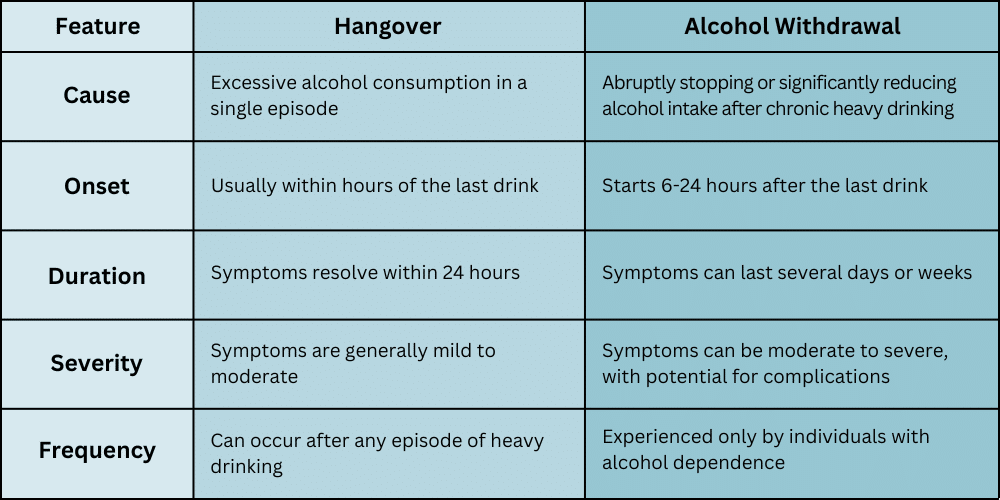Waking up with a pounding headache, nausea, and a general feeling of dread? You might be experiencing the unpleasant effects of a hangover. But what if these symptoms are more severe and persist for longer? This could be a sign of alcohol withdrawal. While both conditions share some similar symptoms, understanding the key differences is crucial for seeking the right treatment and ensuring your safety.
The Unpleasant Reality: What is a Hangover?
A hangover is a temporary yet often debilitating collection of unpleasant symptoms that can arise following excessive alcohol consumption. The severity of a hangover is influenced by a multitude of factors, including but not limited to:
- The quantity of alcohol ingested: Consuming larger amounts of alcohol is generally correlated with more severe hangover symptoms.
- The type of alcoholic beverage: Different types of alcohol, such as distilled spirits, wine, or beer, may contribute to varying degrees of hangover intensity.
- Individual physiological factors: Personal attributes such as age, weight, metabolism, and overall health can impact hangover severity.
Consequently, a hangover can manifest in a variety of symptoms, including:
- Throbbing headache: This is perhaps the most common and distressing symptom of a hangover, often characterized by pulsating pain in the head.
- Nausea and vomiting: Digestive upset is frequently experienced, leading to feelings of queasiness and, in some cases, vomiting.
- Fatigue and lethargy: A hangover can induce profound tiredness and lack of energy, making it difficult to concentrate or engage in daily activities.
- Dizziness and lightheadedness: Impaired balance and coordination can occur, accompanied by sensitivity to light and noise.
- Muscle aches and pains: General body discomfort, including muscle soreness, may develop.
- Dehydration: Excessive alcohol consumption can lead to fluid loss, resulting in dehydration and its associated symptoms such as dry mouth and thirst.
Fortunately, the duration of a hangover is typically limited to 24 hours. Nevertheless, while there is no definitive cure, several strategies can help alleviate discomfort and expedite recovery.
- Hydration is paramount: Replenishing lost fluids is crucial. Consuming ample amounts of water and electrolyte-rich beverages can help combat dehydration and its associated symptoms.
- Rest is indispensable: Providing the body with sufficient time to recuperate is essential. Sleeping in a dark, quiet environment can aid in relaxation and promote healing.
- Pain relief can be beneficial: Over-the-counter pain medications, such as ibuprofen or acetaminophen, can help manage headaches and body aches. However, it’s important to follow the recommended dosage and consider potential interactions with alcohol.
- Avoiding triggers: While tempting, further alcohol consumption should be strictly avoided as it can exacerbate hangover symptoms. Opting for bland foods, such as toast or crackers, can help soothe an upset stomach.
By implementing these strategies, individuals can effectively manage hangover symptoms and expedite their recovery process. However, it’s essential to remember that excessive alcohol consumption should be avoided altogether to prevent the occurrence of hangovers and associated health risks.
The Deeper Concern: Understanding Alcohol Withdrawal
Alcohol withdrawal is a more serious condition that occurs when someone who is physically dependent on alcohol abruptly stops drinking or significantly reduces their intake. This dependence develops over time with chronic and excessive alcohol consumption. When alcohol is suddenly removed from the body, the central nervous system experiences a disruption, leading to a range of withdrawal symptoms.
Unlike a hangover, which typically resolves within a day, alcohol withdrawal symptoms can be more severe and last for several days or even weeks. The severity depends on the degree of dependence on alcohol.
Here’s how to distinguish between a hangover and alcohol withdrawal:

Common symptoms of alcohol withdrawal include:
- Anxiety and irritability
- Tremors (shaking)
- Insomnia (trouble sleeping)
- Sweating
- Nausea and vomiting
- Loss of appetite
- Headache
- Difficulty concentrating
- Seizures (in severe cases)
If you suspect you are experiencing alcohol withdrawal, seeking medical attention is crucial. Alcohol withdrawal can have serious and potentially life-threatening complications, such as seizures and delirium tremens (DTs). Our team at Relief Recovery Center can provide medical detox support to help manage withdrawal symptoms safely and effectively. You can learn more about our detox program here [invalid URL removed].
The Dangers of Alcohol Withdrawal: Why You Need Professional Help
Alcohol withdrawal is a serious medical condition that requires professional care. Attempting to detoxify from alcohol on your own can be extremely dangerous and even fatal. The symptoms of alcohol withdrawal can range from mild to severe, and the severity depends on factors such as the amount of alcohol consumed, the duration of alcohol use, and individual factors.
It’s important to understand that alcohol withdrawal is not just a physical process. The psychological and emotional effects can be equally challenging. Anxiety, depression, and irritability are common during withdrawal, and these symptoms can contribute to relapse.
The Detoxification Process
Detoxification, or detox, is the initial step in the recovery process for alcohol addiction. It involves a medically supervised withdrawal from alcohol under the care of healthcare professionals. Consequently, this process enables the safe management of withdrawal symptoms and helps prevent potential complications.
Furthermore, at Relief Recovery Center, our experienced medical team provides a comfortable and supportive environment for alcohol detox. We utilize evidence-based treatments and medications to manage withdrawal symptoms and minimize discomfort. Ultimately, our goal is to assist you in safely and effectively transitioning through the detoxification process.
It’s essential to remember that detox is just the beginning of recovery. Once you have completed detox, our treatment programs can provide you with the tools and support you need to maintain long-term sobriety.
Seeking Help for Alcohol Withdrawal
If you or someone you know is struggling with alcohol dependence, it is crucial to seek professional help. Therefore, don’t hesitate to reach out to Relief Recovery Center for support and guidance. Our admissions coordinators are available 24/7 to answer your questions and assist you in taking the first step towards recovery.
Additionally, remember that you don’t have to go through this alone. We are here to support you every step of the way.
Additional Resources:
- Substance Abuse and Mental Health Services Administration (SAMHSA)
- National Council on Alcoholism and Drug Dependence (NCADD)
Alcohol withdrawal is a serious condition that should not be ignored. By understanding the risks and seeking professional help, you can increase your chances of a successful recovery.
Take the first step towards a healthier life. Contact Relief Recovery Center today.



